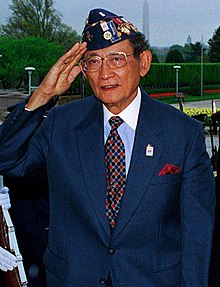Fidel Ramos
Fidel Valdez Ramos (born March 18, 1928 in Asingan, Lingayen , Pangasinan Province ) is a former Filipino general and politician. He was the twelfth President of the Philippines .
origin
Fidel Valdez Ramos is the son of the journalist, lawyer and long-time member of the House of Representatives Narciso Ramos , who in 1967 as Foreign Minister signed the treaty establishing ASEAN in Bangkok . He is related to President Ferdinand Marcos through his mother, the teacher and suffragette Angela Valdez .
Military career
West Point and Korean War
In 1946 Ramos embarked on a military career. He first completed training at the military academy in West Point . After graduating from West Point in 1950, he studied at the University of Illinois , which he graduated as a civil engineer in 1951.
During the Korean War he was a lieutenant and leader of an infantry platoon from 1952 to 1953 .
Further training and Vietnam War
After the Korean War, he continued his engineering studies. He then received military training in units of the United States Army in Fort Benning , Georgia and Fort Bragg , North Carolina . At Fort Bragg, he was the best graduate of his class in 1960 in the subject “ Special Forces , Psychological Warfare and Air Transport ”.
After returning from the USA in 1962 he was the founder and until 1965 commander of the special forces of the Philippine Army (AFP-SF). It was a paratrooper force that was mainly used to fight communist insurgents .
On the side of the US Army from 1966 to 1968 during the Vietnam War he was Chief of Staff of the Philippine Troop Contingent ("Philippine Civil Action Group" / AFP-PHILCAG).
Marcos regime and support from Corazon Aquino
Between 1968 and 1970 he was Deputy Chief of Home Defense Staff of the AFP. In 1970 he became chief of the Philippine constabulary , which was initially part of the Philippine armed forces and later became part of the regular Philippine police. In 1984 he finally became lieutenant general and deputy and acting chief of staff.
During his long service, Ramos increasingly became a critic of the president and his regime, despite his loyalty to President Ferdinand Marcos due to his family ties . When the situation became increasingly critical, he and the then Defense Minister Juan Ponce Enrile refused allegiance to the president at the end of January 1986 and supported the protests against the Marcos regime during the EDSA revolution in the following weeks . This made it possible to appoint Corazon Aquino as president, the widow of the opposition leader Benigno Aquino, who was murdered under Marcos .
Ramos reached the climax of his military career shortly afterwards, when he was promoted to General and Chief of Staff of the Philippine Armed Forces by President Corazon Aquino in February 1986 after the overthrow of President Marcos .
In January 1988, Fidel Ramos ended his active military career and succeeded Juan Ponce Enrile as Minister of Defense. He held this office until 1991. During his tenure, he campaigned for the strengthening of civil protection and national security and order. At the same time he was the cabinet member responsible for regional development in the southwest of the Philippines.
Presidency 1992-1998
In 1992, Fidel Ramos was elected President in the first multi-party presidential election in the history of the Philippines. On June 30, 1992, he was sworn in as the twelfth President of the Republic of the Philippines. He was the first and so far only Evangelical President of the predominantly Catholic Philippines.
To achieve his electoral success, he founded the People Power Party (Partido Lakas Tao), which formed a coalition with several other parties, and thus found broad support among the electorate.
During his six-year presidency, Ramos tried to remove the traces of the twenty-year Marcos dictatorship. He was able to successfully defend himself against a series of military coups . At the same time he advocated a political strengthening of the population in order to achieve economic growth, social equality and national solidarity. He also initiated government programs for environmentally compatible development and environmental protection as well as a leaner bureaucracy.
After the presidency
After the end of his presidency, Ramos and his wife Amelita “Ming” Martinez campaigned for many projects in the field of environmental protection and the development of culture and art as well as securing the future.
Awards
- 1995: Knight Grand Cross of the Order of St. Michael and St. George
- 1997: Félix Houphouët Boigny Peace Prize with Nur Misuari , Chairman of the Moro National Liberation Front, Philippines
Speeches and publications
- An IMF Success Story - AFTER 30 YEARS OF STRUGGLING, THE PHILIPPINES EMERGES WITH A SOUND ECONOMY ( Memento from October 16, 2007 in the Internet Archive )
- TOWARD A LIVING ASIA-PACIFIC COMMUNITY ( Memento from March 6, 2008 in the Internet Archive ), November 1996
Web links
- Fidel Ramos in the nndb (English)
- Information in rulers.org
- Biography in geocities.com with further information ( Memento from January 5, 2008 in the Internet Archive )
- Biography in globalpinoy.com
| personal data | |
|---|---|
| SURNAME | Ramos, Fidel |
| ALTERNATIVE NAMES | Ramos, Fidel Valdez |
| BRIEF DESCRIPTION | Philippine President |
| DATE OF BIRTH | March 18, 1928 |
| PLACE OF BIRTH | Lingayen |
